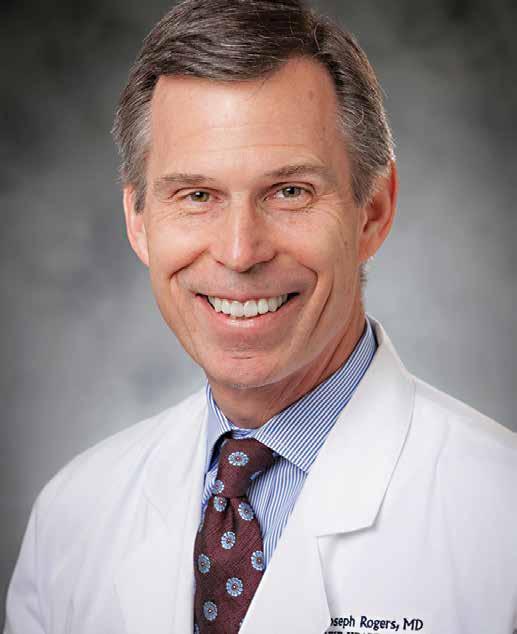
9 minute read
Legal Matters
Who Is Going to Cover Covid Hospitalizations – Commercial Health Plans or Workers’ Compensation
By C. Ryan Morgan, J.D. Tish R. Pickett, J.D. Polsinelli, PC
Advertisement
Commercial health plans are delaying and even denying reimbursement for COVID-19 hospitalizations — especially high-dollar inpatient stays. Plans are attempting to defer these claims to workers’ compensation on the health plans’ assertion that COVID-19 is a work-related illness. Some hospitals defer to health plans, as it relates to these types of claims, because it is plausible that patients could have contracted COVID-19 at work and because workers’ compensation is typically primary for coordination of benefits purposes. But workers’ compensation is notoriously complex, and hospitals may not understand the nuances of the program enough to know when it is appropriate to challenge this type of health plan denial. Failing to appeal these denials may impact hospital reimbursement, as well as a hospital’s accounts receivable days, known as “AR days,” depending on the number of COVID hospitalizations and the corresponding amount in open balances. A. Demystifying Workers’ Compensation With a Brief Overview
It is important to have a general understanding of workers’ compensation coverage. Workers’ compensation is a state-mandated insurance program that protects employers and employees from financial loss when employees suffer job-related injuries and illnesses. Virtually all employers, even small employers, must maintain workers’ compensation coverage. If an employee suffers an occupational injury or illness, an employer through its workers’ compensation carrier may provide missed wage replacement, temporary and permanent disability, death benefits, and supplemental benefits. But one of the basic benefits in all states is medical and hospital benefits. Each state regulates workers’ compensation coverage differently, which is a critical factor with respect to COVID-19 and whether a health plan may delay or deny payment. In some states, employer premiums for workers’ compensation policies are experience-rated, meaning that employers that file more claims pay more in premium. B. States’ Response to Classifying COVID-19 as an Occupational Illness
When it comes to COVID-19 as an occupational illness, states have responded differently. On one hand, 17 states and Puerto Rico have extended workers’ compensation coverage to include COVID-19 as a work-related illness. Within this group of states, there are varying degrees of coverage. The majority of these states have established COVID-19 workers’ compensability presumptions for various types of workers. In these states, if a designated worker contracts COVID-19, it is generally presumed that the worker acquired the virus during the course of employment thus eligible for workers’ compensation, including medical and hospital benefits. But employers can dispute this presumption and produce evidence to the contrary, if done so within a certain amount of time under state law. Hospitals are often left out of this decision-making process, which is unfortunate because hospitals may have additional information about where the worker contracted COVID-19.
On the other hand, some states still consider COVID-19 an “ordinary disease of life,” similar to a cold or the flu, which means the virus is not covered by workers’ compensation. Still other states have taken no action to clarify whether COVID-19 hospitalizations and treatments should
see Legal Matters...page 14

HOUST ON – MEDIC AL CENTER
Travel to be moved.
Come experience the Medical Center’s AAA Four Diamond hotel and create memorable moments while indulging in our oasis of fine dining and personalized service.
Live the InterContinental Life
6750 Main Street, Houston, Texas 77030 713.422.2779 | intercontinentalhouston@ihg.com ichoustonhotel.com | safinahouston.com
PlAN WISEl Y. YOU
WON'T GET A □□-OVER.
A successful retirement in the future can often depend on having a solid plan now. If your money isn't working as hard as you are, it may be time to act-there are no doovers in retirement planning. Now is the time to consider developing a strategy that can help you work toward your financial goals. I specialize in providing comprehensive, objective financial guidance with the goal of maximizing every remaining moment of the retirement countdown. Call today to learn more or to schedule a consultation.

MIDTOWN FINANCIAL GROUP, LLC. Grace S. Yung, CFP®
Managing Director 3355 W. Alabama St., Ste. 180 Houston, TX 77098 713-355-9833 Direct 1-855-464-3869 Toll Free grace.yung@lpl.com www.midtownfg.com
Securities and advisory services offered through LPL Financial, a Registered Investment Advisor, Member FINRA/ SIPC.

Texas Heart Institute Announces New President and CEO
Duke University Health System Chief Medical Officer and cardiologist Dr. Joseph G. Rogers Will Take the Helm at THI in May
Joseph G. Rogers, M.D. – Chief Medical Officer of Duke University Health System and Professor of Medicine in Cardiology at Duke University School of Medicine – has been named President and Chief Executive Officer of the Texas Heart Institute in Houston, Texas. Texas Heart Institute (THI) Board Chairman Eric D. Wade announced Rogers’ appointment following a national search. “Dr. Rogers possesses the skillful leadership and expertise that the Texas Heart Institute needs during a pivotal moment in its history. With the recent launch of Joseph G. Rogers, M.D. the Texas Heart Medical Group, seminal discoveries in cardiovascular care in the COVID Chief for Clinical Affairs in Duke’s era, and our responsibility to educate Division of Cardiology when it was and train the best and brightest ranked number five in the country. fellows in cardiology, Dr. Rogers Today, Rogers serves as the brings experience to lead THI’s Chief Medical Officer at Duke’s mission to reduce the devastating preeminent health care system, toll of cardiovascular disease through which educates and trains thousands innovative programs in research, of physicians and health care education, and improved patient professionals. It attracts more than care,” said Wade. 69,000 annual patient stays and two “I am honored to have been million outpatient visits and is ranked chosen to lead THI, arguably the most as a top 20 hospital in the country. storied and influential cardiovascular Rogers has authored more than 230 institute in the United States. I look publications and has maintained a forward to building upon the strong research portfolio with NIH funding foundation laid by the teams of throughout his career. He remains clinicians, researchers, and educators deeply involved in leading-edge at THI to increase the Institute’s LVAD research, including serving as impact on cardiovascular disease,” Dr. the principal investigator on several Rogers stated. national studies. At Duke University and in In addition to clinical and his earlier career at Washington research roles, Dr. Rogers oversees University, where Rogers received graduate medical education, with more training as both a clinical and than 1,000 trainees currently enrolled. research fellow, he led clinical program He has led initiatives to guide quality development in transplant, heart care and safety, and he has focused failure, and mechanical circulatory on the development of diversity and support. At Washington University, inclusion programs. He understands Rogers oversaw and expanded the the importance of outreach programs cardiac transplant program, developed and community engagement. the disease management program, and Rogers is expected to begin his started its LVAD program. At Duke, new duties at the Texas Heart Institute Rogers led its heart failure program on May 17, 2021. . from 2004 to 2013. He served as Vice

Collagen Plays Protective Role During Pancreatic Cancer Development
Findings Suggest the Protein Helps Slow Tumor Progression, Pointing To New Cancer Therapeutic Strategies
Contrary to long-held beliefs, Type I collagen produced by cancer-associated fibroblasts may not promote cancer development but instead plays a protective role in controlling pancreatic cancer progression, reports a new study from researchers at The University of Texas MD Anderson Cancer Center. This new understanding supports novel therapeutic approaches that bolster collagen rather than suppress it. The study finds that collagen works in the tumor microenvironment to stop the production of immune signals, called chemokines, that lead to suppression of the anti-tumor immune response. When collagen is lost, chemokine levels increase, and the cancer is allowed to grow more rapidly. The research was published today in Cancer Cell. “Collagen has been the most highly studied component of the tumor microenvironment for decades, but its precise role has remained unclear,” said senior author Raghu Kalluri, M.D., Ph.D., chair of Cancer Biology. “Now, we understand that it is part of a cancer defensive strategy of the body. If we can better understand that strategy, even if it may be suboptimal, we can work to shore up our body’s natural defenses to have therapeutic impact.” Collagen, the most abundant protein in the human body, is produced by a class of cells called fibroblasts and is found mostly in bones, tendons and skin. The protein also tends to accumulate in and around tumors during cancer development and growth, leading researchers to hypothesize that it helps promote tumor growth, metastasis or drug resistance, Kalluri explained. To investigate these possibilities and clarify the role of collagen, the research team created a mouse model in which collagen is not produced by cancer-associated fibroblasts during pancreatic cancer development. After genetically deleting collagen from these cells, called myofibroblasts, more than 50% of the total collagen was absent in the tumor microenvironment. With collagen reduced, pancreatic cancer growth accelerated, and the overall survival of the mice significantly decreased, suggesting that collagen plays an important role in blocking cancer progression. The researchers looked further to understand how collagen was impacting tumor development. In tumors with reduced collagen, the cancer cells produced higher levels of chemokines known to attract myeloid-derived suppressor cells (MDSCs), a type of immune cell that dampens anti-tumor immune response. Indeed, the researchers found that collagen-deficient tumors had more MDSCs present and fewer immune cells, such as T cells and B cells, that could mount an effective anti-tumor response. Interestingly, blocking chemokine signaling activity with targeted therapies reversed the immune profile in these tumors and slowed tumor progression, bringing it back to a level similar to that of controls. “This was somewhat surprising because we think of pancreatic cancer as a cancer with poor immune surveillance – with an immunosuppressive tumor microenvironment,” Kalluri said. “However, this study shows that the immune system actually is controlling pancreatic tumor growth to some extent, and we see an even more detrimental immune suppressive tumor microenvironment when collagen is lost.”
Noting that pancreatic cancer is one of the most aggressive tumor types with poor outcomes overall, Kalluri acknowledged that collagen by itself may not be a particularly effective defense mechanism, but it shows that our bodies are doing what they can to control cancer development. He likens the body’s response to a car with faulty brakes. The car cannot stop as efficiently as it might with good brakes, but it is better than a car with no brakes at all. The challenge now, Kalluri explained, is to identify a therapeutic strategy to fix those brakes, by increasing collagen levels or boosting collagen’s downstream effects to further strengthen the anti-tumor response. Exploring these strategies will be the focus of future work by Kalluri’s team.
Raghu Kalluri, M.D., Ph.D.

AT BLUE HERON BAY

2 and 3 Story Waterfront Villas – all with Direct Access to Lake Conroe From the $600’s Desirable Gated Community Open and Spacious Living Concept which allow Views of the Water



Text “LaVie” to 88000
for more photos & floorplans



